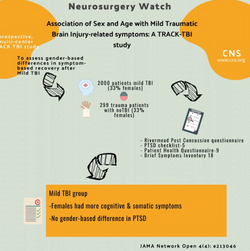
-Sex difference in recovery from traumatic brain injury (TBI) has been demonstrated in multiple studies
-Multiple factors may contribute to the sex difference in TBI recovery, such as hormonal factors, sex difference in premorbid factors such as psychiatric disorders, difference in psychosocial stress, and the difference in reporting of symptoms
-Primary aim of this study was to characterize sex differences in the symptoms-based recovery in patients with mild TBI in the prospective, multi-center TRACT-TBI study
-Primary outcome assessments include the Rivermead Post Concussion symptoms questionnaire, Posttraumatic Stress Disorder checklist-5, Patient Health Questionnaire-9, and Brief Symptoms Inventory 18
-A total of 2000 mild TBI patients were included in the study (1331 men, 669 women), along with 299 (199 men, 100 women) orthopedic trauma injured patients without TBI were used as control
-Within the mild TBI group, male patients had a lower average age, less likely to be insured, had less education, and had a higher prevalence of previous TBI also drug use. On the other hand, female patients had a higher likelihood to live independently, with a higher prevalence of anxiety, depression, and sleep disturbance.
-There was TBI x sex interactions was significant for both the cognitive symptoms and somatic symptoms on the Rivermead Post Concussion questionnaire with females having more significant symptoms.
-There was no significant TBI x sex interaction on the Posttraumatic Stress Disorder Checklist, Patient Health Questionnaire-9, and Brief Symptoms Inventory 18
-Within the female age subgroups, the age 35-49 female subgroup had a much more significant somatic symptoms in the Rivermead Postconcussion Symptoms questionnaire compared to their orthopedic injured control, as well as compared to the two other age subgroups (age 17-34, and age greater than 50). There was no significant difference in terms of the cognitive and emotional symptoms.
Source
JAMA Network